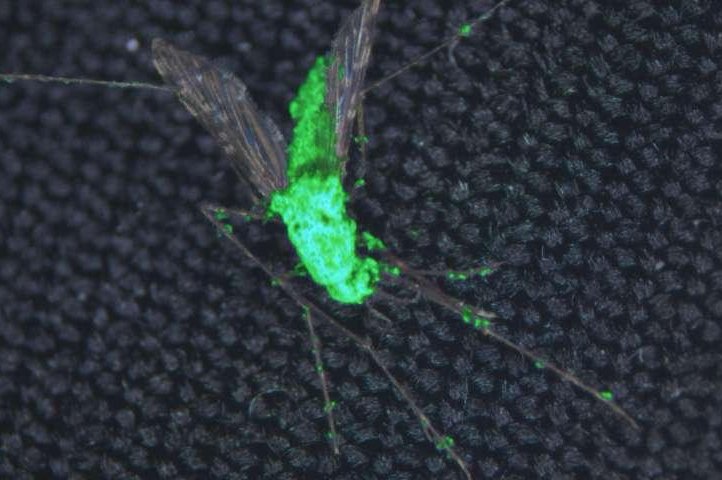A dead mosquito is seen covered in the new fungus, genetically engineered to produce spider and scorpion toxins. Photo by Brian Lovett/UMD
June 13 (UPI) -- An international team of scientists is taking a unique approach in the battle against malaria-carrying mosquitoes. The team, lead by researchers from the University of Maryland, have designed a mosquito-targeting fungus that replicates spider and scorpion toxins.
The fungus is not a risk to humans and early test results suggest it is safe for honeybees and other beneficial insects.
"In this paper, we report that our most potent fungal strains, engineered to express multiple toxins, are able to kill mosquitoes with a single spore," Brian Lovett, a graduate student in Maryland's entomology department, said in a news release. "We also report that our transgenic fungi stop mosquitoes from blood feeding. Together, this means that our fungal strains are capable of preventing transmission of disease by more than 90 percent of mosquitoes after just five days."
The fungus species Metarhizium pingshaensei naturally targets mosquitoes, and research suggests the spores colonize the disease-carrying species Anopheles gambiae and Aedes aegypti.
The fungal spores can penetrate a mosquito's exoskeleton, invading the insect's insides, but a sizable spore count is needed to kill a mosquito -- and the process can be lengthy. Scientists set out to boost the fungi's potency by rewriting its genome.
Researchers engineered the fungus to express genes triggering the production of different combinations of neurotoxins from spider and scorpion venom. The toxins disrupt the nervous system by thwarting the calcium, potassium and sodium channels of communication -- channels necessary for the delivery of nerve impulses.
Researchers tested their new fungal strains on wild-caught, disease-carrying mosquito species known to be resistant to insecticides. The genetically engineered fungal strains proved more deadly than the unaltered fungus.
The most effective fungal strain was buoyed with toxins from the North African desert scorpion and the Australian Blue Mountains funnel-web spider -- Androctonus australis and Hadronyche versuta, respectively.
Researchers installed a genetic switch in the fungus that ensures the toxins are only expressed in the blood of insects and are not released into the environment.
"The toxins we're using are potent, but totally specific to insects. They are only expressed by the fungus when in an insect. Additionally, the fungus does nothing at all to bees and other beneficial species," said Raymond St. Leger, a professor of entomology at Maryland. "So we have several different layers of biosecurity at work."
Researchers detailed their mosquito-fighting breakthrough in the journal Scientific Reports.















